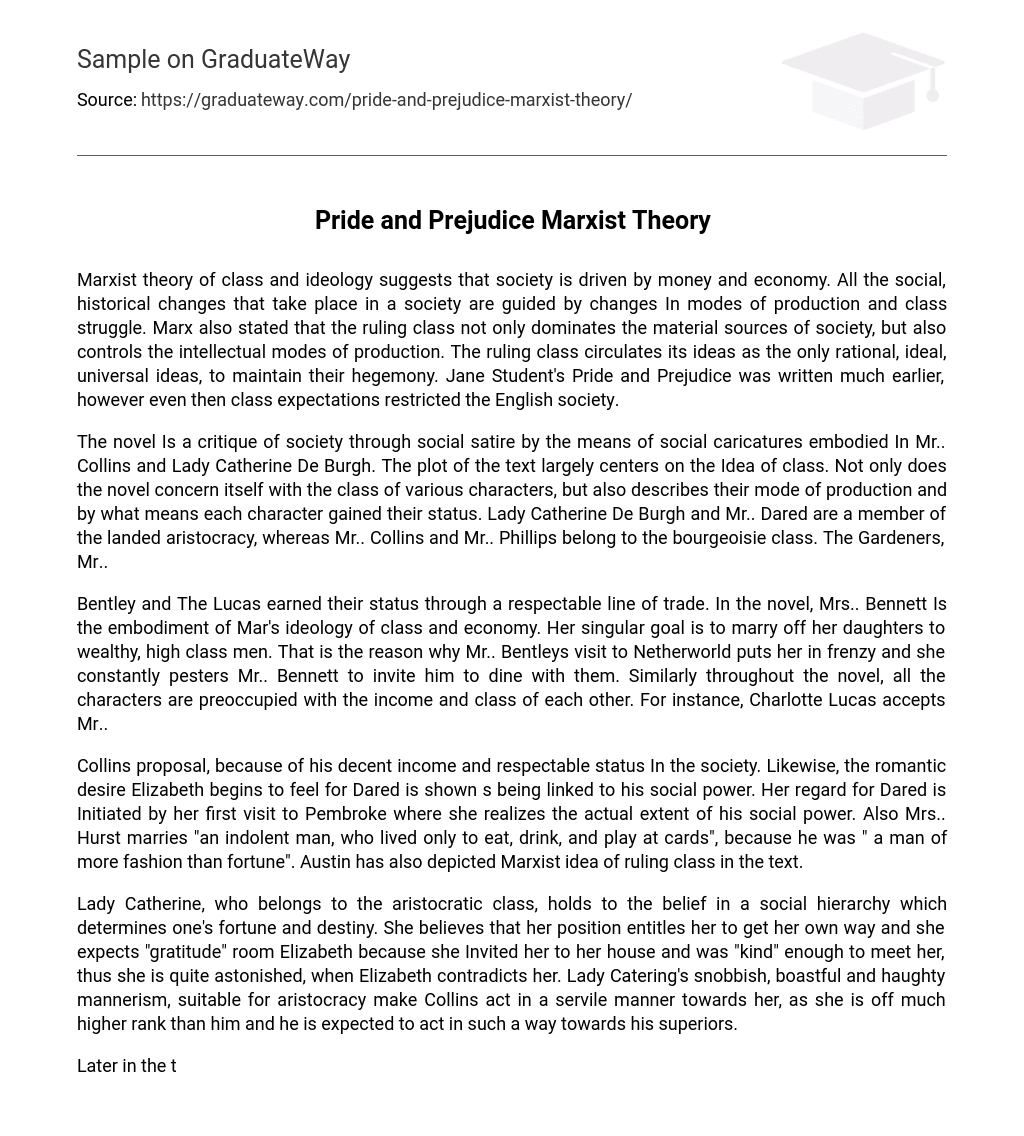According to Marxist theory, money and the economy are the driving forces behind society. This theory suggests that changes in modes of production and class conflict influence all social and historical transformations within a society. Additionally, Marx believed that the ruling class not only controls society’s material resources but also dominates the intellectual means of production. They promote their ideas as the only rational, ideal, and universal beliefs in order to maintain their hegemony. Despite Jane Student writing Pride and Prejudice earlier, English society was still bound by class expectations during that period.
The text examines societal issues through social satire using social caricatures in the form of Mr. Collins and Lady Catherine De Burgh. Its plot is primarily focused on social class. In addition to delving into the class of different characters, the novel also explores their modes of production and the ways in which they attained their positions. Lady Catherine De Burgh and Mr. Dared belong to the landed aristocracy, while Mr. Collins and Mr. Phillips are part of the bourgeoisie class. The Gardners are mentioned as well among the characters.
Bentley and The Lucas achieved their social standing through respectable professions. In the novel, Mrs. Bennett personifies Mar’s belief in social status and economic stability. Her main objective is to marry off her daughters to wealthy men from high class backgrounds. This is why Mr. Bentley’s visit to Netherworld causes her great excitement, leading her to continuously urge Mr. Bennett to invite him for dinner. Likewise, throughout the book, all the characters are obsessed with each other’s wealth and social standing. For example, Charlotte Lucas agrees to marry Mr.
The proposal made by Collins is influenced by his decent income and respectable status in society. Similarly, Elizabeth’s romantic feelings towards Dared are connected to his social power. Her admiration for Dared begins when she visits Pembroke and witnesses the extent of his social influence. Additionally, Mrs. Hurst chooses to marry a lazy man who only seeks pleasure in eating, drinking, and gambling because he represents a higher social position rather than financial wealth. Jane Austen also portrays the Marxist concept of the ruling class in this text.
Lady Catherine, a member of the aristocracy, holds firm to the belief in a social hierarchy that determines one’s fortune and destiny. She believes her position entitles her to have her desires met and expects “gratitude” from Elizabeth because she invited her to her house and was “kind” enough to meet her. Lady Catherine is taken aback when Elizabeth contradicts her. Lady Catherine’s snobbish, boastful, and haughty behavior, which is fitting for the aristocracy, causes Collins to act in a subservient manner towards her. He recognizes that she is of a much higher rank than him and feels obligated to act accordingly towards his superiors.
Later in the text, Lady Catherine is unable to accept Dared and Elizabeth’s relationship because she believes that Dared marrying someone of lower rank will diminish the prestige of her aristocratic lineage. This highlights the concept of class inequality and the perception of certain social classes being superior or inferior. When Mr. Dared is introduced, he is depicted as arrogant and distant, with his excessive pride stemming from his awareness of his social status.
As a member of a higher social class, Dared is supposed to be respected by lower-class families like the Bennetts, while Elizabeth is expected to show him proper honor, which she somewhat resists doing. Now, Elizabeth faces insolence from Lady Catherine, Miss Bentley, and Mrs. Hurst due to her social status and predetermined class beliefs. The concept of the ruling class’s control over society becomes clear through Mr. Dairy’s influence over Hickman regarding money in exchange for an agreement to marry Lydia.
Due to their upbringing in an upper-class society, the Bennett family possesses an illusion of power within their characters. They enjoy the freedom to make their own decisions and do as they please, with the exception of being controlled by higher authorities such as the Bentleys, Dared, and Lady Catherine. Jane Austen portrays class, economy, and social status as the key driving forces in her novel. Consequently, Pride and Prejudice revolves around patterns of behavior and thinking that align with Marx’s ideals.





